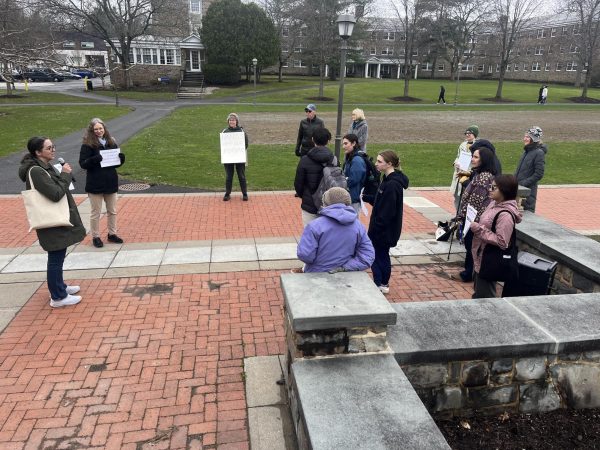
On Friday, April 11, students and faculty gathered outside Soper Commons to rally against recent cuts made to educational funding by the Department of Government Efficiency (DOGE). Organized by Associate Professor of Psychology Alexandra List, this protest was the sixth in the past month and a half rallying against federal funding cuts. Each protest has focused on a different area of funding loss, such as art or Fulbright scholarships, with this most recent one focused on education.
This string of protests started with the Stand Up for Science protest on March 7, which was a part of a national protest by the same name. The scope of this initial protest encompassed the cancellation of grants and funding in the sciences by DOGE, which affected multiple professors and departments within the sciences. However, due to its limited scope, members of Phi Beta Kappa decided to kickstart three more protests over the following week that covered the humanities, Fulbright grants and the arts, as previously covered by The Spectator. After Spring Break, further protests were organized, such as the Stand Up for Libraries and Museums protest on April 4. Each protest has stood for a different area of funding that is being cut or could be cut by DOGE.
DOGE is an advisory committee established by President Trump through an executive order that aims to decrease government spending in order to reduce the national debt. The committee has slashed funding to a variety of federal departments and programs, including pulling grant funding and firing government employees, such as Associate Professor of Mathematics Courtney Gibbons, as previously covered by The Spectator. One of the committee’s recent cuts has been a 50% reduction in the Department of Education workforce as part of plans to entirely cut the department.
Writing Chair Margaret Thickstun, who has acted as a figurehead for these protests, told The Spectator, “They are pulling research funds from big universities over well, for false pretexts, and basically just trying to destroy an industry that the United States is extremely well known for and the envy of the world, and I would like to continue to be able to teach and to have people be able to learn. And I want to stand up for that.”
When asked about the reasons for the recent series of protests, Thickstun said, “The reason to have protests on campus is that we have 2000 students whose lives are going to be seriously impacted by what happens in the next several months and who need to look to their futures and start contacting their representatives and making noise. Everybody who lives and who works on campus lives in New York state and our representatives know how we feel and they agree with us. But students live all over the country, and maybe in districts where their representatives don’t know how they feel and don’t necessarily agree, and they need to be educated. So I would like students to begin to express their opinions and exercise their rights.”
Once the protest began, participants passed around a microphone, giving their reasons for attending the protest. One of these participants, an unidentified faculty member, said, “I’m here because there’s a war on education right now, carried out by the administration, and it serves a number of different purposes. One is there’s a war on the working class in the United States. You can see this in cuts to Medicare, Medicaid, massive tax cuts for billionaires, tariffs and much else. At the same time they’re in preparation for war in the Middle East, including genocide in Gaza, but also quite possibly attacks on Iran. In all of these areas, universities, students, faculty, are all a very important component of free speech and of opposition, and that’s why the Trump administration is carrying out, really, a very, very harsh assault on colleges and universities, much greater, I think, even than in the McCarthy era, which was terrible.”
Career Advisor Virginia Dosch said with microphone in hand, “I am not an educator in the classroom, but we pursue national fellowships and scholarships and now I work as a career advisor. It all matters. Education, higher education matter. Science matters. Humanities matters. The community matters, and we can’t lose that.”
While there have been no announced plans for future protests, another unidentified faculty member at the protest asked students to, “think about participating in public demonstrations in big cities, where we will find there are thousands of other Americans who care about the same things that we do and see the same things that we do. If you have never been in a protest of 10,000 or 50,000 people, I encourage you to do it because you will find a new sense of power as a citizen, just as Barack Obama said, the highest office in this country. So get off campus and protest there too.”
















